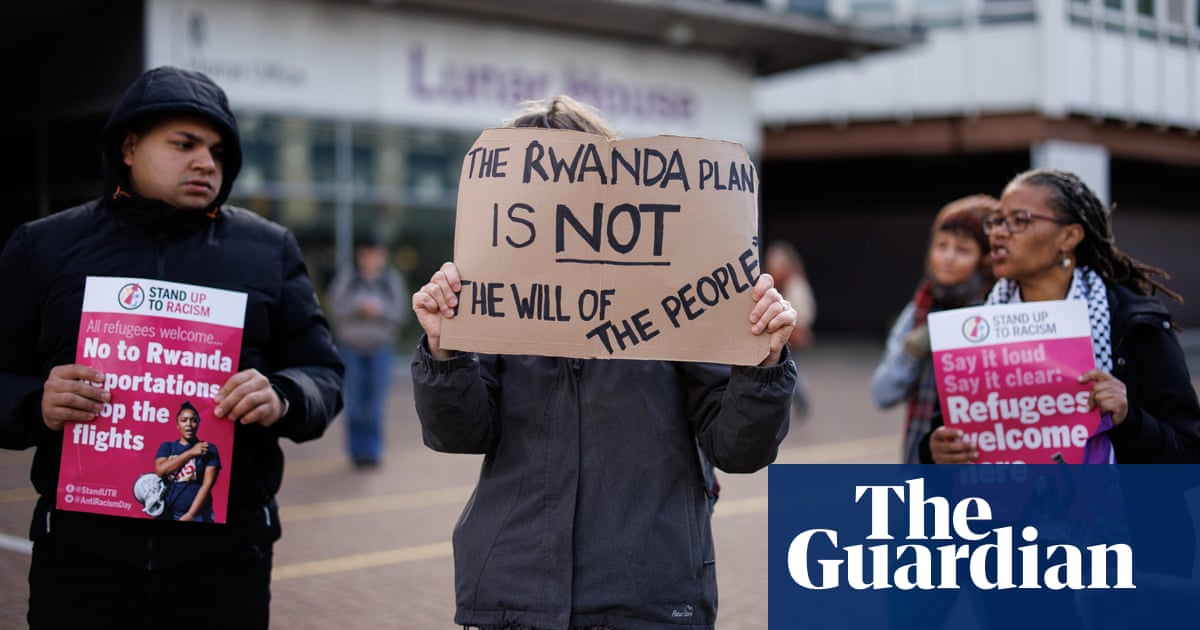
Lawyers have said that UK ministers’ latest plans to get their high-profile Rwanda policy off the ground are unlikely to overcome the legal obstacles that defeated them in the supreme court on Wednesday.
After the five judges unanimously rejected the government’s plans to deport people seeking asylum in the UK to the east African country, Rishi Sunak said that he would ensure the flights could go ahead by legislating that Rwanda was safe.
The UK prime minister also said he would create a new treaty with Rwanda guaranteeing that people deported there from the UK would not be returned to their home countries, a process known as refoulement, the risk of which lay at the heart of the supreme court’s dismissal of the government’s appeal.
But lawyers have said such changes would not achieve Sunak’s aim of ending what he called the legal “merry-go-round” and would be likely still to fall foul of courts.
Adam Wagner, a human rights barrister at Doughty Street chambers, said the supreme court justices “started by saying non-refoulement is a really fundamental concept, and it’s contained in lots of different sources of law. So the government can legislate to say two plus two is five but it doesn’t make two plus two [equal] five. They can legislate to say actually Rwanda is safe; it doesn’t make Rwanda safe as a matter of international and domestic law.”
He cited the supreme court’s reference to a similar treaty between Rwanda and Israel, in which it said there had been “a failure to abide by assurances (including an assurance of non-refoulement)”.
Wagner said: “You can’t change cultures by agreements and, secondly, the court said it didn’t trust Rwanda to honour the agreement. So those are the facts. They’ve got to change and I can’t see how they can change those facts without actually changing the reality on the ground. Legislation won’t change those facts and neither will a treaty.”
Many rightwing Conservatives’ ire has been aimed at the European convention on human rights, but lawyers stressed that it was just one of many treaties binding the UK to the principle of non-refoulement.
Schona Jolly KC, a human rights barrister at Cloisters chambers, said: “The government is not engaging with that detail in its own magical thinking. The facts on the ground matter, and those facts formed the basis of our own supreme court’s judgment. Legislating by decree won’t magically change those facts, and it won’t change the international legal provisions or principles applicable.”
Her comments were echoed by Alexander Horne, a former parliamentary lawyer, who said: that changing “our domestic law is not going to cure your breach of international laws and the supreme court was very clear that you have the refugee convention, the European convention on human rights, the United Nations convention against torture – there’s a whole gamut of these things”.
Even if changes in domestic law meant the supreme court felt bound to rule in favour of the government, the European court of human rights would be unlikely to do so, lawyers said.
If the UK were to ignore the Strasbourg court – as the Tories’ deputy chair, Lee Anderson, has suggested it should do with the supreme court – and breach international law “that would leave us with a pretty unhappy conflict with that court”, said Horne.
More prosaically, there are doubts about whether the government would have the time to get contentious legislation through parliament and the courts before the next election.
Lawyers have also raised concerns about the constitutional ramifications of the government’s response. Parliamentary sovereignty means the government is entitled to legislate in response to a legal defeat, but the Bar Council said that to reverse a court’s finding of fact “would raise profound and important questions about the respective role of the courts and parliament in countries that subscribe to the rule of law”.












